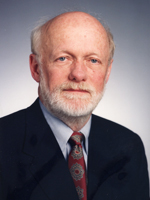Julius Axelrod Award
 Palmer W. Taylor
Palmer W. Taylor
University of California, San Diego
Palmer W. Taylor, Ph.D., is recipient of the 2009 ASPET-Julius Axelrod Award. Dr. Taylor is the Sandra and Monroe Trout Chair in Pharmacology, Associate Vice Chancellor for Health Sciences and Dean of the Skaggs School of Pharmacy and Pharmaceutical Sciences at the University of California, San Diego. The Julius Axelrod Award in Pharmacology was established to honor the memory of the eminent American pharmacologist who shaped the fields of neuroscience, drug metabolism and biochemistry. The Award is given to recognize outstanding scientific contributions in research and mentoring.
Dr. Taylor received his Ph.D., from the University of Wisconsin. An NIH Fellowship at the Medical Research Council in England and later at the Max Planck Institute in Germany was followed by an appointment as Assistant Professor in Pharmacology at UCSD.
Dr. Taylor has made pioneering contributions to the study of synaptic pharmacology and neuroscience by providing detailed molecular insights into fundamental aspects of regulation at cholinergic synapse. Cholinergic neurons serve critical roles in controlling communication between nerve and muscle and between cells in the brain. His recent work on neuroligin, a cholinesterase homologous synaptic adhesion protein associated with autism emphasizes further the biomedical relevance of his research and demonstrates his characteristic use of multifaceted approaches to dissect structure and molecular mechanisms. Dr. Taylor has trained a multitude of graduate students and postdoctoral fellows who have gone on to prominent careers in industry and academia. He is the director of a large and longstanding NIH funded pre-doctoral training grant in Pharmacology and is a dedicated to graduate and medical school teaching. He has served in various leadership positions at including President of ASPET from 1995-1996.
Dr. Taylor delivered the Julius Axelrod Lecture at the 2010 Experimental Biology Meeting.
John Jacob Abel Award
 John J. Tesmer
John J. Tesmer
University of MIchigan
John J.G. Tesmer, Ph.D., Associate Professor of Pharmacology and Research Associate Professor of the Life Sciences Institute at the University of Michigan is the recipient of the 2009 John J. Abel Award, sponsored by Eli Lilly & Co. The Award is given to a single young investigator for original, outstanding research contributions in the field of pharmacology.
Dr. Tesmer received his B.A. degree in Biochemistry and English from Rice University where he performed undergraduate research in the growing field of macromolecular crystallography. This experience led him obtain advanced training in crystallography at Purdue where he earned his Ph.D. He went on to become a Howard Hughes Postdoctoral Fellow at the University of Texas Southwestern Medical Center where he studied the molecular basis of heterotrimeric G protein signaling, such as that mediated between G proteins and the classic effector enzyme adenylyl cyclase. He continued his studies of heterotrimeric G proteins as an Assistant Professor of Chemistry at the University of Texas at Austin. During this time, he received several scientific awards and also established himself as a successful educator, earning the 2004College of Natural Sciences Teaching Excellence Award. In 2005, Dr. Tesmer was recruited to the Life Sciences Institute and the Department of Pharmacology at the University of Michigan where he has diversified his research projects not only to resolve the atomic structures of large signaling complexes but also to test hypotheses derived from these structures using a broad range of biochemical, biophysical, and genetic tools. In honor of his recent accomplishments, Dr. Tesmer was the recipient of the 2008 Basic Science Award from the University of Michigan Medical School.
Dr. Tesmer has consistently made seminal contributions to our understanding of the mechanism of action and structural biology of G protein-coupled receptor (GPCR) signaling cascade. GPCRs are the targets of a large fraction of the drugs currently on market and control a vast range of physiologically important processes ranging from cardiovascular tone to vision. Knowledge of these structures and mechanisms of the proteins found in these cascades opens up new opportunities for the design or discovery of novel therapeutic agents.
Torald Sollmann Award
 S.J. Enna
S.J. Enna
University of Kansas Medical Center
S.J. Enna, Ph.D., Professor of Molecular and Integrative Physiology, Professor of Pharmacology, Toxicology, and Therapeutics, and Associate Dean for Research and Graduate Education at the University of Kansas Medical School is the recipient of the 2009 Torald Sollmann Award. The Award was established by Wyeth Research to commemorate the pioneering work in America of Dr. Torald Sollmann in the fields of pharmacological investigation and education. Dr. Enna was selected for this Award because of his outstanding and productive research career, his devotion to the teaching of pharmacology, and his unparalleled service to ASPET and the discipline it represents.
A native of Kansas City, Missouri, Dr. Enna received his B.A. in biology from Rockhurst University and his M.S. and Ph.D. in Pharmacology from the University of Missouri at Kansas City. After postdoctoral studies at the University of Texas Southwestern Medical School, Hoffmann-La Roche in Switzerland and Johns Hopkins University School of Medicine, Dr, Enna spent a decade at the University of Texas Medical School in Houston. He moved to Nova Pharmaceutical Corporation as Scientific Director and Executive Vice President. In 1992 he returned to his hometown of Kansas City as Chair of the Department of Pharmacology, Toxicology and Therapeutics at the University of Kansas Medical School. He remained as Chair through 2003 and assumed his current role as Associate Dean for Research and Graduate Education at the Medical School in 2007.
Dr. Enna has made significant contributions in defining the pharmacological and biochemical properties of neurotransmitter receptors, in particular those for GABA for which he is considered a leading expert in the field. He has also conducted research into the effects of hormones on neurotransmitter receptor function and receptor responses to psychotherapeutics, the development of receptor antagonists for NMDA, cholinergic muscarinic and bradykinin receptors, and the identification of the cellular components of coincident signaling in brain.
Dr. Enna has also devoted considerable effort to teaching. He received the Basic Science Teaching Award from the medical students at the University of Texas for five of the ten years he was on the faculty there. Adjunct teaching appointments at Johns Hopkins and Tulane are further evidence of his reputation as an instructor. This tradition has continued at the University of Kansas where his department received the Best Teaching Award from medical students in nine of the eleven years he served as Chair.
An active leader in pharmacology at both the national and international levels, Dr. Enna is currently Secretary General of the International Union of Basic and Clinical Pharmacology (IUPHAR). A prolific writer, he has contributed to the education of thousands of pharmacologists and physician through his hundreds of research and review articles as well as the 24 books in the discipline that he has either edited or co-edited. He also has served as editor of some of the major journals in the field including the Journal of Pharmacology and Experimental Therapeutics. Dr. Enna has served on many committees of ASPET and was twice elected to ASPET Council. He was ASPET president in 2000.
Pharmacia-ASPET Award for Experimental Therapeutics
 Kenneth A. Jacobson
Kenneth A. Jacobson
NIDDK/NIH
Kenneth A. Jacobson, Ph.D., Chief of the Molecular Recognition Section and Acting Chief of the Laboratory of Bioorganic Chemistry at the National Institute of Diabetes, Digestive, and Kidney Diseases (NIDDK) is the recipient of the 2009 Pharmacia-ASPET Award for Experimental Therapeutics. The Pharmacia-ASPET Award for Experimental Therapeutics is given annually to recognize and stimulate outstanding research in pharmacology and experimental therapeutics—basic laboratory or clinical research that has had, or potentially will have, a major impact on the pharmacological treatment of disease. This award is funded by an endowment from Pharmacia (now Pfizer) and by ASPET.
Dr. Jacobson received his B.A. in Chemistry from Reed College in Portland, Oregon and M.S. and Ph.D., from the University of California, San Diego. After completing his Postdoctoral work at the Weizmann Institute in Israel, he joined NIDDK at the National Institutes of Health.
His creativity and his ability to combine the field of chemistry with those of pharmacology and molecular biology have had a major impact on biomedical research and therapeutic development. Over the course of two decades at NIH, Dr. Jacobson has made major contributions to the pharmacology of cell surface receptors, in particular purinergic receptors. Early in his career he pioneered the concept of “functionalized congeners,” a now widely used approach in drug development. More recently he introduced the concept of “neoceptors.” His research has led to agents in clinical trials for cystic fibrosis, cancer, cardioischemia, rheumatoid arthritis, psoriasis, and asthma. Dr. Jacobson was recently included in a listing of the ten most cited researchers in the field of pharmacology.
The Epilepsy Research Award for Outstanding Contributions to the Pharmacology of Antiepileptic Drugs
 Tallie Z. Baram
Tallie Z. Baram
University of California, Irvine
Tallie Z. Baram, M.D., Ph.D., Professor in the Departments of Pediatrics, Anatomy/Neurobiology and Neurology at the University of California, Irvine, is recipient of the 2009 ASPET-Epilepsy Award. The Award is sponsored by ASPET and the International League Against Epilepsy and donated by Pfizer. The award is to recognize and stimulate outstanding research leading to better clinical control of epileptic seizures.
A native of Israel, Dr. Baram received her Ph.D. from the Weizmann Institute of Science and her M.D. from the University of Miami School of Medicine. She completed her medical residency in pediatrics and fellowship in child neurology at the Baylor College of Medicine. She later joined the faculty at the University of Texas and MD Anderson before moving to the Children’s Hospital of Los Angeles and the University of Southern California. At UC Irvine, she also holds the Danette Shepard Endowed Chair in Neurological Sciences and is Scientific Director of the UCI Epilepsy Program as well as founder and Executive Committee Chair of the UCI Epilepsy Research Center.
Dr. Baram has studied two important pediatric seizures: infantile spasms and febrile seizures. Her contributions have revolutionized the field. Recognized internationally by her peers, Dr. Baram was chosen for the prestigious honor in Basic Research in Epilepsy, the American Epilepsy Award in Basic Epilepsy Research. Dr. Baram’s research was also chosen by the National Institute for Neurological Sciences and Stroke (NINDS) for the Javits Merit Award.
ASPET Astellas Awards for Translational Pharmacology
The ASPET-Astellas Awards in Translational Pharmacology are intended to recognize pharmacological research accomplishments that seek to extend fundamental research closer to applications directed towards improving human health. The awards will be given to 1) recognize those individuals whose research has the potential to lead to the introduction of novel pharmacologic approaches or technologies that may offer significant advances in clinical medicine in the future and 2) to facilitate that translational process. The awards are made possible by a grant to ASPET from the Astellas Foundation.
Piyali Dasgupta
Marshall University
 Piyali Dasgupta, Ph.D., of the Marshall University Medical School is a recipient of the 2009 ASPET-Astellas Award in Translational Pharmacology. Dr. Dasgupta is currently Assistant Professor in the Department of Pharmacology, Physiology and Toxicology at Marshall University Medical School. She received her undergraduate degree from the University of Delhi and Masters of Science in Chemistry from the Indian Institute of Technology in New Delhi. She earned her Ph.D. from the Jawahalal Nehru University in India and began a postdoctoral fellowship at the College of Physicians and Surgeons, Columbia University. Subsequently, the research group moved to the Moffitt Cancer Center in Tampa, Florida.
Piyali Dasgupta, Ph.D., of the Marshall University Medical School is a recipient of the 2009 ASPET-Astellas Award in Translational Pharmacology. Dr. Dasgupta is currently Assistant Professor in the Department of Pharmacology, Physiology and Toxicology at Marshall University Medical School. She received her undergraduate degree from the University of Delhi and Masters of Science in Chemistry from the Indian Institute of Technology in New Delhi. She earned her Ph.D. from the Jawahalal Nehru University in India and began a postdoctoral fellowship at the College of Physicians and Surgeons, Columbia University. Subsequently, the research group moved to the Moffitt Cancer Center in Tampa, Florida.
Dr. Dasgupta’s major emphasis in teaching and research is understanding how signaling mechanisms underlying tobacco components like nicotine contribute to the pathophysiology of lung cancers. Her research has direct clinical relevance to human lung cancer therapy.
Paul A. Insel
University of California, San Diego
 Paul A. Insel, M.D., of the University of California at San Diego (UCSD) is a recipient of the 2009 ASPET-Astellas Award in Translational Pharmacology. Dr. Insel is currently Professor and Vice-Chair of Pharmacology and Professor of Medicine and Director of the M.D.-Ph.D Medical Scientist Training Program at UCSD. He received his M.D. from the University of Michigan Medical School and completed an internship and residency at Harvard. After serving as a Clinical Associate at NIH, he did post-doctoral work and was Assistant Professor in residence in Clinical Pharmacology at the University of California at San Francisco before moving to UCSD as Assistant Professor in the Department of Medicine, Division of Pharmacology, which later became the Department of Pharmacology.
Paul A. Insel, M.D., of the University of California at San Diego (UCSD) is a recipient of the 2009 ASPET-Astellas Award in Translational Pharmacology. Dr. Insel is currently Professor and Vice-Chair of Pharmacology and Professor of Medicine and Director of the M.D.-Ph.D Medical Scientist Training Program at UCSD. He received his M.D. from the University of Michigan Medical School and completed an internship and residency at Harvard. After serving as a Clinical Associate at NIH, he did post-doctoral work and was Assistant Professor in residence in Clinical Pharmacology at the University of California at San Francisco before moving to UCSD as Assistant Professor in the Department of Medicine, Division of Pharmacology, which later became the Department of Pharmacology.
Dr. Insel has made substantial research contributions in multiple areas of molecular pharmacology. Through studies of cell culture models, experimental animals and human material, his research efforts have provided important insights regarding receptors, especially G-protein-coupled receptors (GPCR) and their signaling events. Dr. Insel has also taken leadership roles through editorships of several journals, including Molecular Pharmacology, and has played an active role in professional societies, including ASPET.
Richard R. Neubig
University of Michigan
 Richard R. Neubig, M.D., Ph.D., of the University of Michigan is a recipient of the 2009 ASPET-Astellas Award in Translational Pharmacology. Dr. Neubig joined the University of Michigan from Harvard Medical School where he earned his M.D. and Ph.D. After starting as a House Officer at the University of Michigan Hospital, he was appointed as an instructor in the Department of Pharmacology. He is currently Professor in the Department of Pharmacology and Co-Director the University of Michigan’s Center for Chemical Genomics which he helped to establish.
Richard R. Neubig, M.D., Ph.D., of the University of Michigan is a recipient of the 2009 ASPET-Astellas Award in Translational Pharmacology. Dr. Neubig joined the University of Michigan from Harvard Medical School where he earned his M.D. and Ph.D. After starting as a House Officer at the University of Michigan Hospital, he was appointed as an instructor in the Department of Pharmacology. He is currently Professor in the Department of Pharmacology and Co-Director the University of Michigan’s Center for Chemical Genomics which he helped to establish.
Dr. Neubig is a pioneer in the study of RGS proteins and has been at the forefront in both conceptual and experimental work to develop the novel RGS family as therapeutic drug targets. Since RGS proteins modulate the signaling of G protein coupled receptors which are very important in clinical drug development, successful pharmacological targeting of RGS proteins would have significant therapeutic potential. For these and many other related contributions, Dr. Neubig is recognized nationally and internationally as a leading authority on RGS proteins.
Graduate Student Travel Award Winners
Quaisar Ali
Amy Arnold
Monica Arnold
Erika Boerman
Remy Brim
Chun Cheng Andy Chen
Yukun Chen
Uade da Silva
Robert Davis
Natasha DeVore
Melanie Felmlee
John Foley
Stephen Fuhs
Jacob Garza
Robert Gould
Laurel Grisanti
Steven Hart
Edward Hawkins
Yousuke Horikawa
Nidhi Kaushal
|
|
Jennifer King
Carolyn Kitchens
Stephen Kraynik
Prasad Krishnan
Christel Kroigaard
Evan Lebois
Victor Lima
San San Lin
Silu Lu
John Lyssand
Veronica Mackey
Alexander Mackie
Vandana Megaraj
Anne Mullen Grey
Ana Rita Nunes
Amanda Obaidat
Kristen Osterlund
Elina Pathak
Damie Phua
|
|
Stephanie Piecewicz
Jesse Procknow
Lauren Purington
Megan Roth
Ravi Sajja
Mohamed Saleh
Praveen Shukla
Najla Taslim
Arunkumar Thangaraju
Tracy Thennes
Inimary Toby
Michael Tranter
Nien-pei Tsai
Tingting Wang
Hui Wang
Lindsay Wilson
Mingyi Yao
Anja Christina Zahno |
Young Scientist Travel Award Winners
Poulomi Acharya
Adebowale Adebiyi
Ningfei An
Debra Bangasser
Clinton Canal
Takato Hiranita
Michael Holinstat
Pimonrat Ketsawatsomkron
Jun-xu Li
Elizabeth Linder
Sarah Lindsey
Fiona Murray
|
|
Beatrice Nyagode
Sukru Oner
Gracious Ross
Nichole Sanders
Xiaowei Sun
Kah Poh Hendrick Tan
Keshari Thakali
Susan Wood
Zhengyuan Xia
Mustafa Yilmaz
Wenbo Zhang
|
Summer Undergraduate Research Fellowship Travel Award Winners
Renee Jordan (Mentor: Nancy Rusch, University of Arkansas for Medical Science)
Ke Xu (Mentor: Van Doze, University of North Dakota)
Lisa Zelinsky (Mentor: Raymond Quock, Washington State University)